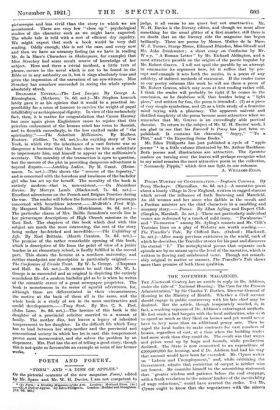David the Son of Jesse. By M. C. Strachey. (Jonathan
Cape. 7s. 6d.).—In David the Son of Jesse Miss Marjorie Strachey has written a very curious book. We are quite used to writers who, like Mr. Arnold Bennett in Judith, take minor Bible or classical narratives- and enlarge them and make them more picturesque. We are also accus- tomed by now to the method of Sir James Frazer, who tells the tales from the point of view of comparative religion. Several characters in the Old' Testament have also been psycho-analysed ; but Miss Marjorie Strachey has done none of -these things. The story of David is, of course, one of the most detailed and sustained narratives in the- Bible, and in• many instances- she produces an impression of having condensed' the original. The novel is throughout losa
picturesque and less vivid than the story to which we are accustomed. There are very few " close up" psychological studies of the character such as we might have expected. The whole tale is told with a sort of efficient dry rapidity. We might expect that such a book would be very dull reading. Oddly enough, this is not the case, and every now and then we have an uncanny feeling (as we have in reading Mr. de la Mare's Characters in Shakespeare, for example) that Miss Strachey had some occult source of knowledge of her subject. Here and there a trivial incident, a little turn of phrase, occurs in the novel which is not to be found in the Bible or in any authority on it, but it rings absolutely true and gives the impression of the narration of an eye-witness. Miss Strachey has somehow succeeded in seeing the whole episode absolutely afresh.







































 Previous page
Previous page